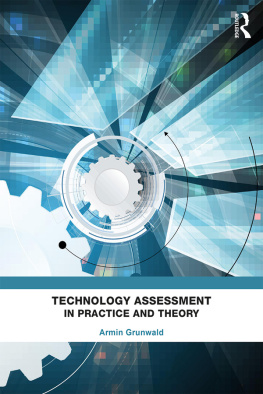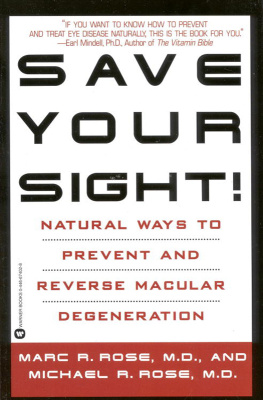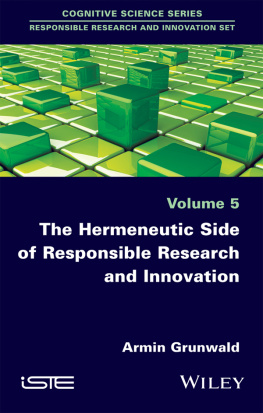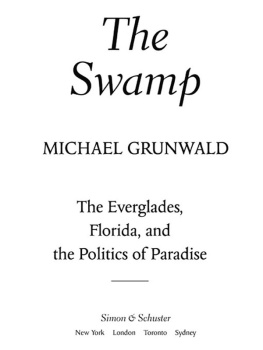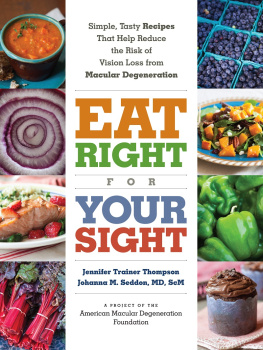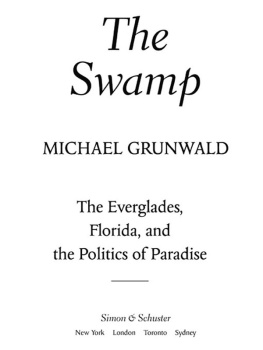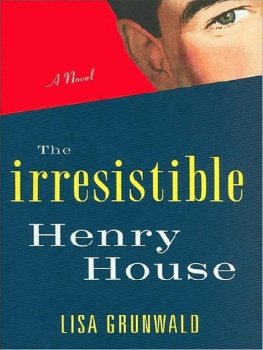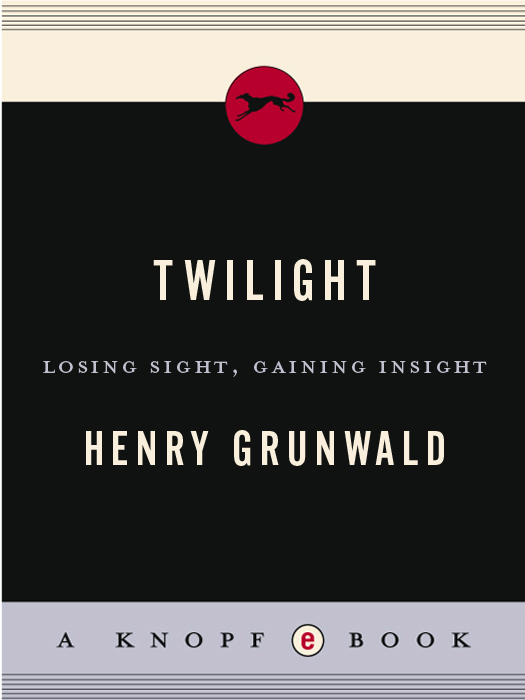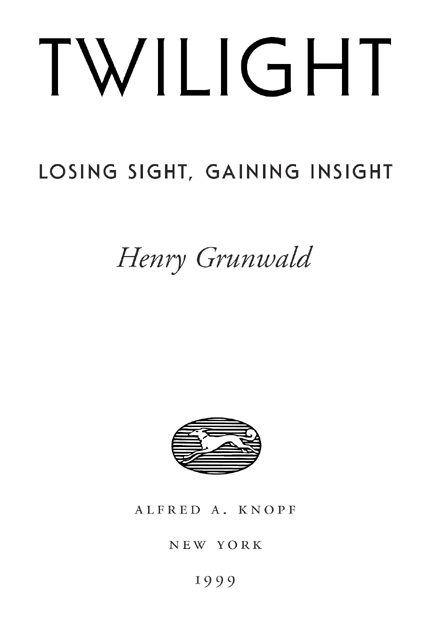ALSO BY HENRY GRUNWALD
One Mans America: A Journalists Search
for the Heart of His Country
THIS IS A BORZOI BOOK
PUBLISHED BY ALFRED A. KNOPF, INC .
Copyright 1999 by Henry Grunwald
Copyright 2012 Lighthouse International
All rights reserved under International and Pan-American Copyright Conventions. Published in the United States by Alfred A. Knopf, Inc., New York, and simultaneously in Canada by Random House of Canada Limited, Toronto. Distributed by Random House, Inc., New York.
www.randomhouse.com
Knopf, Borzoi Books, and the colophon are registered trademarks of Random House, Inc.
Portions of the poem Quintet for 4 Senses, Macular Degeneration: A Progress Report from the unpublished collection The Eye Inside the Storm are reprinted here by permission of the author, Marilyn Jurich.
Library of Congress Cataloging-in-Publication Data
Grunwald, Henry A. (Henry Anatole)
Twilight : losing sight, gaining insight / Henry Grunwald.
p. cm.
eISBN: 978-0-307-81894-2
1. Grunwald, Henry A. (Henry Anatole) 2. Retinal degenerationPatientsUnited States Biography. 3. Blind agedUnited States Biography. 4. EditorsUnited States Biography.
I. Title.
PN4874.G79A3 1999
362.41092dc21
[B]
99-35757
v3.1_r1
For Meta
In loving memory
Contents
ACKNOWLEDGMENTS
The severe eye problem I describe in this book made me more than ever dependent on the help of my collaborator, Sarah Lewis, who not only took down my words and tirelessly read them back to me but also functioned as an invaluable editor, critic, researcher, and source of inspiration. My gratitude to her is boundless.
My assistant, Dorothy Paulsen, had to carry many extra burdens while I was writing this book. She was cheerful and inexhaustible in keeping my office and much of my life in order.
My wife, Louise, followed successive versions of the manuscript, always ready with encouragement and creative suggestions. She read to me continually from newspapers, magazines, and books. Her keen eyes supplemented, and sometimes substituted for, my own limited vision. She described and explained people and places, landscapes and architecture; and, with her knowledge of art, she brought paintings and sculpture to life for me. For all this and more she has my loving thanks.
My childrenPeter, Mandy, and Lisahelped me as a writer with good advice as well as vivid recollections, and helped me as their father with close and affectionate support.
My doctors David Guyer and Lawrence Yannuzzi not only treated me with skill and devotion but tutored me in the intricacies of macular degeneration and eye problems in general.
I gained much information and practical help from many members of that splendid institution the Lighthouse in New York, including its president, Barbara Silverstone; one of its guiding spirits, Dr. Eleanor Eaton Faye; and the low vision expert Dr. Bruce Rosenthal. A special source of inspiration was Dr. Josephine DeFini.
Nikolai Stevenson, the founder and head of the Association for Macular Diseases, gave me his friendship and wise perspective on our ailment, and an example of how to accept it with patience and good humor.
I am indebted for research help to Stephen Mihm of the New York Times Magazine: Brigid OHara-Forster of Time-Europe in London; Edmund McMahon Turner of Moorfields Hospital, London; John Handley of the American Academy of Ophthalmology; Professor Robert Gurland of New York University; James Cassetta of the Pearl River, New York, Public Library; and the Time Research Services.
I am grateful for guidance in the arts to Everett Fahy of the New York Metropolitan Museum of Art, the late designer Mark Hampton, the author and musicologist Jonathan Schwartz, and Mandy Patinkin.
My thanks also to my very constructive editor, Dan Frank; to Harold Evans for his initial support of this project; and to my friend and agent, Lynn Nesbit of Janklow and Nesbit, for her enthusiastic backing.
The New Yorker, under the editorship of Tina Brown, published an article in 1996 called Losing Sight, which was the starting point for this book.
1
In the primordial ocean, a tiny organism stirs. It is covered with a light-sensitive pigment, an eyespot, that seeks the sun and turns the organism toward it. The act is not seeing, but the precursor of seeing. It is part of the fundamental impulse in all living things to reach for light, part of the indomitable will to see.
I stand at the edge of the ocean and I think of those eyespots and of the single-cell creatures that, eons ago, began the miraculous process of sight. I, too, strain to seeto see the waves, the sand, the shells and seaweed and debris that wash ashore. My eyes are animated by the same impulse, the same will to see. But my eyes dont work, at least not fully, because they are blocked by disease. The scene around me appears through a kind of curtain, a haze. If I bend down, I will have a hard time telling a stone apart from a shell, a coin from a piece of sea glass. If I were to pick up a discarded newspaper, I would not be able to read it. During a lifetime as a writer and editor, reading newspapersor news in any formhad been a natural and indispensable part of myself. My existence seemed to be wrapped in the printed word. No longer.
Until the onset of my disease, I was literally unaware of my eyes, with the occasional trivial exception of needing new glasses or having somebody extricate a speck of dust. Now I am aware of my eyes almost constantly. I imagine them as distinct globes inside my head. I try to visualize the intricate vessels and veins and conduits in these globes. I think of their fragility but also of their power. In medicine as well as in romantic poetry, it is the heart that is the center and controlling mechanism of life. If the heart stops, life stops. The loss of sight does not mean death. Yet for ages, the eye was believed to contain a human beings vital essencea not wholly irrational belief. For those of us who are born with the ability to see, sight determines most of what we know about the world, what we enjoy, and what and whom we love. That is surely one reason why in the mythology of almost every culture the eye plays a dominant part.
My years with failing vision have prompted me to learn about the nature of the eye and the incredible gift of sight, which I had always taken for granted until it began to slip away. But I also learned about living within limits and overcoming disability. This, then, is not merely a story about seeing but also about living. It is a story not merely about losing sight but about gaining insight as well.
In 1992, my wife, Louise, and I rented a villa outside Florence. The light in the house was inadequate, especially in the gloomy, rainy weather of that October; the twenty-five-watt bulbs in the pseudoelegant sconces reminded me of those notoriously underlit Russian hotel rooms. One afternoon, I picked up a carafe from a side table in a particularly dark corner to pour water into a glass. I missed the glass. I inveighed against the landlord, who, I thought, was trying to save electricity with those weak lightbulbs, but I suspected that I might need new glasses. Back in New York, quite unconcerned, I dropped in on the nearest optician. In a darkened cubicle, he took me through the usual eye test. I have worn glasses ever since I was a teenager. Using both eyes, I read the chart without difficulty, but when my right eye was covered and I looked only through the left, I saw virtually nothing. My right eye, on the other hand, was close to normal and, as I realized later, saw for both. The optician seemed embarrassed, and he took me through the test again. The result was the same. I think you had better see an eye doctor, he said.


